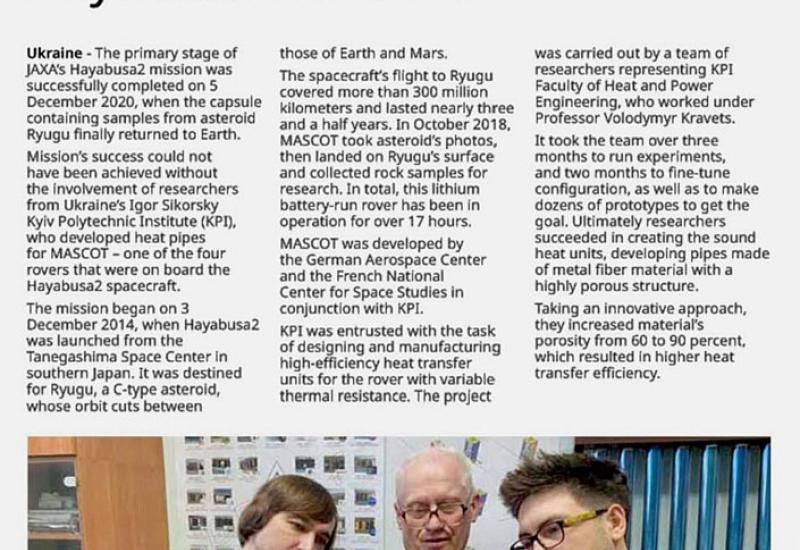The quarterly magazine QS Global Education News (QS GEN), published by Quacquarelli Symonds, gave an article in the March edition about our University's contribution to the mission of the spacecraft Hayabusa-2. It was the first experience of disseminating information about the achievements of Igor Sikorsky Kyiv Polytechnic Institute to such a large specialized international audience – the QS ranking covers more than 1,600 universities around the world. We offer this article to the readers of Igor Sikorsky Kyiv Polytechnic Institute.
On December 5, 2020, the MASCOT module completed a space mission and delivered soil to Earth from the asteroid Ryugu. Had Igor Sikorsky Kyiv Polytechnic Institute not made heat pipes for the device, Hayabusa would not have been able to survey the asteroid for more than a year and collect samples.
The space mission began on December 3, 2014. It was the day when the Japanese spacecraft Hayabusa-2 launched from the largest rocket-launch complex Tanegashima. It aimed to study a Class C dark asteroid of the rare spectral type, whose orbit in the perihelion enters the Earth's orbit, and in aphelion, it touches the orbit of Mars. The space probe has traveled more than three billion kilometers to the research object. It took Hayabusa three and a half years to reach Ryugu. Since October, the MASCOT module, descending from a height of 51 meters, has taken a series of photos, successfully landed on the asteroid, and took the soil samples for research. The module powered by a battery and operated for more than 17 hours.
The module approximately measures 30x30x20cm and has a mass of 9.6kg. The German Aerospace Center and the National Centre for Space Studies of France, jointly with experts of Igor Sikorsky Kyiv Polytechnic Institute, developed the module. Our specialists had a mission to produce heat pipes of a certain size, configuration, and weight for the spacecraft. The Faculty of Heat and Power Engineering developed the project under the supervision of Professors Mykhailo Semena and Volodymyr Kravets. As part of the project, Igor Sikorsky Kyiv Polytechnic Institute scientists produced heat pipes of metal-fibrous porous structure for the spacecraft. Their know-how was to increase porosity from 60 to 90 percent and heat transfer efficiency as well. Igor Sikorsky Kyiv Polytechnic Institute scientists have not achieved the desired results immediately. The experiments have lasted for three months, and adjusting to the set parameters - two more. In total, several dozen pipes had been made before the set parameters were reached.
In the end, our scientists managed to get the job done thanks to fundamental knowledge, technical ingenuity, and hard work. Igor Sikorsky Kyiv Polytechnic Institute is proud that our scientists helped complete the Hayabusa-2 space mission successfully.

